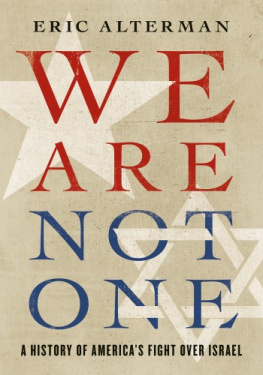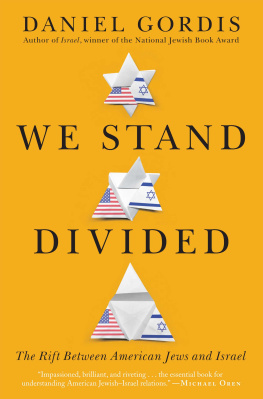First Published 2008 by Transaction Publishers
Published 2017 by Routledge
2 Park Square, Milton Park, Abingdon, Oxon OX14 4RN
711 Third Avenue, New York, NY 10017, USA
Routledge is an imprint of the Taylor & Francis Group, an informa business
All rights reserved. No part of this book may be reprinted or reproduced or utilised in any form or by any electronic, mechanical, or other means, now known or hereafter invented, including photocopying and recording, or in any information storage or retrieval system, without permission in writing from the publishers.
Notice:
Product or corporate names may be trademarks or registered trademarks, and are used only for identification and explanation without intent to infringe.a
Library of Congress Catalog Number: 2010047367
Library of Congress Cataloging-in-Publication Data
Feingold, Henry L., 1931
Jewish power in America : myth and reality / Henry L. Feingold.
p. cm.
ISBN 978-1-4128-0835-4
1. Jews--United States--Politics and government--20th century. 2. Jews--United States--Politics and government--21st century. 3. Jews--United States--Attitudes toward Israel. 4. United States--Ethnic relations. I. Title.
E184.36.P64F45 2011
973.04924--dc22
2010047367
ISBN 13: 978-1-4128-4216-7 (pbk)
ISBN 13: 978-1-4128-0835-4 (hbk)
In memory of Herbert A. Cohen and Donald Newman who pointed the way.
From a statement by the foreign minister of Malaysia, to a recent study of an imagined Jewish control of American foreign policy, to an ad in the nations leading newspapers exposing a satanic plot by the Israel lobby, the notion of a Jewish power conspiracy continues to haunt the anti-Semitic imagination.
The latest accusation that focuses on neoconservative control of the nations Middle East policy is foreboding because the notion of a Jewish power conspiracy has found place in the mind of credentialed thinkers and policy makers. It can no longer be simply dismissed as the ravings of lunatic fringe anti-Semites. Senator Fulbright, who railed against excessive Jewish influence in the making of the nations Middle East policy in the sixties and seventies, or former President Carters charges that drew an analogy with the apartheid policy of South Africa are not easily dismissed as chronic haters. Many reviewers of the work of Professors Mearsheimer and Walt find it primarily wanting in the quality of scholarship, rather than its anti-Semitic content. The authors tout themselves as supporters of Israel and support the right of Jews to lobby in their interest. Moreover, the focus of a special animus on Israel makes the charge of inordinate Jewish power more feasible. Unlike American Jewry, Israel, after all, has an army that has demonstrated its mettle on the field of battle. This book is not intended as a response to Mearsheimer and Walt, but when two highly accredited scholars produce a polemic dressed in scholarly academic clothing that draws upon a vintage negative image concerning Jews and power, it arouses concern.
There is Jewish power at play in the American polity that sometimes, like the American Irish in earlier decades, may seem inordinate. Yet when only seventy years have passed since two out of three European Jews were murdered in a genocidal spree, the notion of a satanic Jewish power again at work in the world needs to be treated with alarm. The charges and stereotypes attacking Zionism and Israel are strikingly familiar. We need to be clear about it; American Jewry stands accused not so much of a Rothschild-like conspiracy to control the worlds money supply, but the more conceivable aspiration of projecting an inordinate influence on the nations Middle East policy to ensure the well-being of Israel. American Jewry is, after all, well known for its deep concern for the welfare and security of Israel.
To be sure, Jewish political power exists as a separate agency in the American polity, but before we can determine whether it is inordinate, it needs to be identified and defined. It is not the kind of power that is preoccupied with military armaments as associated with a sovereign state like Israel. Nor is it personal power. There are many influential Jews today who raise huge sums for office seekers, but there are none like Jacob Schiff, who, at the turn of the twentieth century, controlled the Kuhn Loeb banking interests and was totally committed to using his vast wealth to alleviate the persecution of Russian Jewry. With the exception of an abiding concern with the security of Israel, there are no overriding public policy concerns that differentiate the Jewish voter from the informed formally educated segment of the American electorate. The overwhelming Jewish support for stem-cell research, for example, is fully shared by the American voter with a similar level of education and income. Yet power there must be, not because anti-Semites have conjured it through the ages. By definition all living things have some degree of power. As a thriving community, American Jewry cannot be imagined without it. Individual empowerment and its broad distribution is, after all, a basic aspiration of the American social and political system. We are therefore compelled to begin with acknowledging the truth of the assumption that American Jews do have some political power. But what kind is it and is it inordinate compared to the power exercised by other ethnic and interest groups that thrive in the American polity? Above all, the basic charge of those who have raised the alarm about Jewish power, that it is used conspiratorially against the national interest, needs to be addressed.
This book seeks an answer to these queries, not through learned discussions about the alchemy of power, which is the province of political scientists, but by examining five recent major instances, beginning with the New Deal, when the play of Jewish power, or power exercised by Jews, was evident. This historical approach rests on the assumption that a great deal can be learned about power by observing how the American Jewish community responds to crisis or special circumstances where the use of communal power can be readily observed.
The chapters that follow are not intended as a complete study of Jewish political culture, but they contain sufficient information to illustrate the complexity of the Jewish power question. The parameters of the power problem are initially probed in the first chapter, which exposes the complexity of the problem. That is followed by five broad areas chosen because they reveal most about the play of Jewish power. The first three focus on the area of American Jewrys primary interest in foreign policy. It includes the American Jewish response to the Holocaust, which is contrasted with its response in the following chapter to the travail of Soviet Jewry. The reasons why the projection of Jewish power for the freeing of Soviet Jewry was more successful than the far more urgent case for the rescue of European Jewry during the Holocaust is probed. The third chapter in this triad concerns American Jewrys political advocacy role vis--vis Israel, which has triggered the current complaint about the inordinate use of Jewish political power. That discussion is followed by three chapters that deal with the manifestation of Jewish power in domestic politics. The stage for that discussion is set by an examination of the sources of Jewish political culture, with an emphasis on the historic roots of the remarkable activism of the Jewish electorate and its heightened leadership role in movements for change and reform. The remarkable engagement of American Jewry in the political process now amply documented by survey research and evidenced by the disproportionate number of Jewish officeholders on all levels of government can be traced in some measure to its relationship to the Eastern European Jewish migration and to the inherent activism of the political left.







